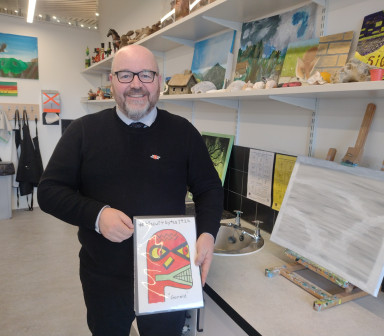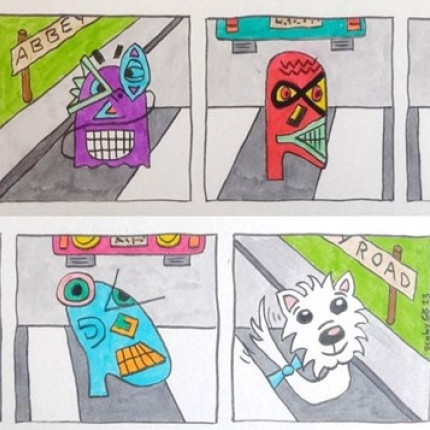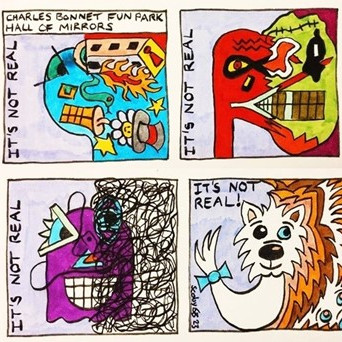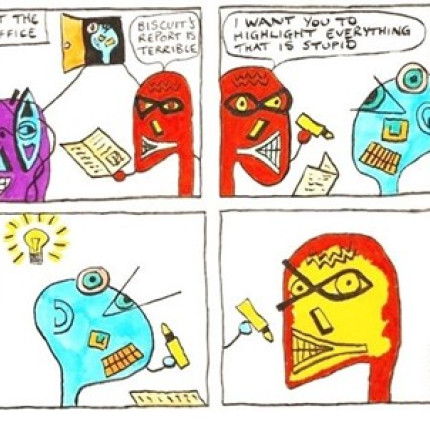Setting yourself a challenge is a great way to commit to something new and begin a new hobby. In October 2023, Air Force veteran Scott Boyle challenged himself to draw a sketch every single day of the month.
“By the end of October, I was worn out,” Scott laughed, “but, in January, the weather was stinking and I was sitting at home… and I just got drawing again. The ideas kept coming.”

Now, four months since ‘Ink-tober’, Scott is still drawing comics and has finished drawing more than 65 original comic strips.
Scott says: “My comic is called ‘Biscuit Bytes’, and it’s the adventures of four characters: a purple-coloured character called ‘The dot’, the red-coloured ‘Gerald’, blue-coloured ‘Biscuit’, and their playful dog pal, Elsie.”
“Each comic strip has four boxes to tell the story. The stories are just little ideas in your life, observations you come across.”
Adventures in Scott’s comics include the four characters taking part in the Great British Bake-off, travelling to the moon, playing in a band, or going to the Winter Olympics. The comics can be found on Scott’s Instagram page, @BiscuitBytes1924.

My comic is called ‘Biscuit Bytes’, and it’s the adventures of four characters: a purple-coloured character called ‘The dot’, the red-coloured ‘Gerald’, blue-coloured ‘Biscuit’, and their playful dog pal, Elsie.
Scott’s experience of visual impairment
In several comic strips, Scott presents his experience of visual impairment. Since he had a stroke two years ago, Scott has had a large gap in his right-hand side peripheral vision. This gap is permanently filled by hallucinations, which is a phenomenon called Charles Bonnet Syndrome.
Scott said: “One of my Biscuit Bytes comics shows the four characters, but they are like a hall of mirrors because they're all distorted by Charles Bonnet Syndrome.”
The image is a comic strip showing the four characters, but there are distorted shapes and squiggly lines in the corners of the comic, replicating the impact that Charles Bonnet syndrome has on Scott’s sight.
Scott said: “I can see straight ahead down the centre okay, but normally, at all times, my vision has squiggles and lines on the right-hand side where I don’t have any peripheral vision. It used to be as much as 45 degrees of my sight – a whole person could disappear from my sight in my peripheral vision. But it’s a little better now.”
Scott, who served in the Royal Air Force as a ground technician for 22 years, reckons his time in the military strengthened his determination to overcome challenges.
“When I had the stroke, everything got turned on its head. I felt my life was at rock bottom. You think you’re at the low ebb, but you know, you’ve been in the military, and we’ve got skills. You know it’s not as bad as that. You know you can get up again.”
Scott has learned to ignore the hallucinations and keep focused on the task at hand.
“Because I hallucinate in my right-hand side, I tend to turn my head, and my left eye faces down the centre of what I’m looking at. Then I can push my hallucinations out to the right and I don’t get disturbed by them when I’m trying to concentrate.
“I use my symbol cane to warn people there’s something not quite right with my vision.”
In addition to visiting the Hawkhead activity centre, Scott also attends a Veterans’ Sight Support Group, run by Sight Scotland Veterans.
“Every six weeks on a Thursday, there’s between six and eight of us veterans, meeting at a pub in Cumbernauld. We just have a bit of cake or scones, and just shoot the breeze.
“There’s no structure or anything – you just meet up and chat, and it’s a great way to keep in touch.”
Scott believes meeting other people impacted by vision loss has proved crucial.
“That’s definitely been a massive part of my rehabilitation. The way I’ve adapted to dealing with my sight loss is by talking to other people, and seeing how they adapt. If I was just in my own town, I don’t know anybody with sight problems, and I’d have no one to talk to about it.”

Military service
Scott served in the Air Force from the age of 18 to the age of 40.
“I was a ground technician in the service and maintenance of radar and radio,” Scott said. “I was attached to the Royal Air Force Regiment section, at RAF Lossiemouth. I was a Bowman Service Manager, so I controlled the functionality and the maintenance and repair of this new radio system the military was introducing, called Bowman, to replace the Clansman system.
We deployed the Bowman system in Iraq and Afghanistan and used it in Iraq and Afghanistan.
“Using Bowman, you can see where your troops are on the battlefield. You can’t see your enemy of course – they’re not sending you GPS! But you can mark where they are, from your troops’ reports.”
Scott progressed to the rank of sergeant and served in many territories, including the Falkland Islands.
“I’ve seen a lot of different places and many different things. Afghanistan and Iraq were not nice places, but I’ve also been to Alaska, the Falklands’, and the Himalayas. I was hiking and mountain biking in Alaska. There are really nice things you can do with the Forces.”
Scott said: “After 22 years, I needed a break. I went to Afghanistan for seven months, then back here for a year, before heading to Iraq for six months. When I got to the age of 40, I decided that my military career was coming to an end.”
New challenges
After leaving, Scott completed an HNC and an HND at a college, then did a degree in software development.
“The week after I left college, I joined a software development company in my hometown. I started building websites for the government, for HMRC.”
Scott worked in I.T. for six years. Unfortunately, he had a heart attack in 2016, and then a stroke in 2022, and he finished working.
“After I had the stroke, I didn’t want to leave the house,” he said.
Scott’s new challenge, since his stroke, has been reclaiming his independence and his social life.
“I got help from social workers and I got the travel card [the National Entitlement card]. I realised I needed to start building up my independence again, so I travel everywhere by bus now. I quite like the independence. I’m trying to learn how to cook again too.”
Getting out and chatting with others has lifted Scott’s mood too.
“I was never the best at small talk, but now I’m travelling and I am amongst people a lot more, and I’m always asking how people are and having a chat. I’ve found it very rewarding going to courses at the Glasgow School of Art. You’re meeting new people, and by the end of the ten weeks, you feel like you really get to know them.”

Want to learn more about Veterans Sight Support Groups?
To find out more about our support groups, or information about apply for a National Entitlement Card (NEC), get in touch.
In Scotland, the NEC gives travellers with visual impairment free bus travel. Some privately owned ferries, premium airport buses and bus tours may not be included, however.